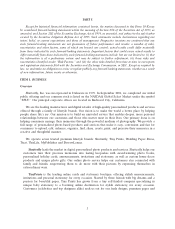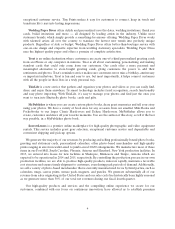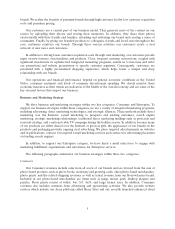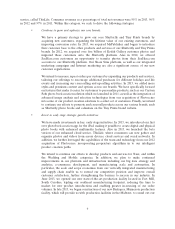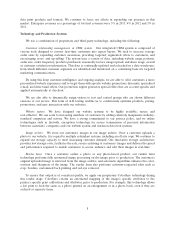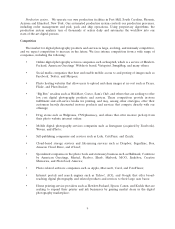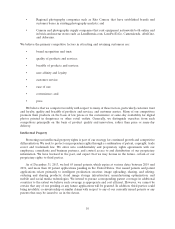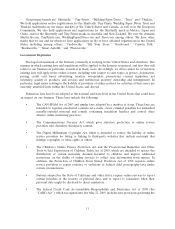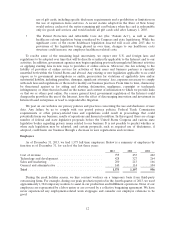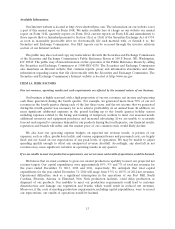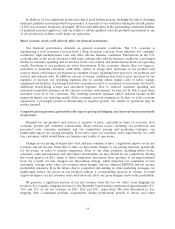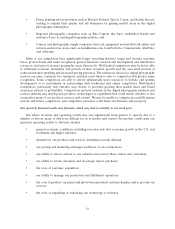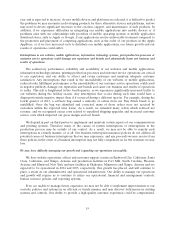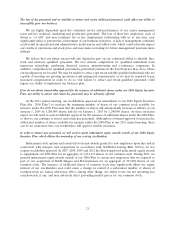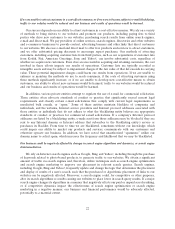Shutterfly 2013 Annual Report Download - page 14
Download and view the complete annual report
Please find page 14 of the 2013 Shutterfly annual report below. You can navigate through the pages in the report by either clicking on the pages listed below, or by using the keyword search tool below to find specific information within the annual report.
use of gift cards, including specific disclosure requirements and a prohibition or limitation on
the use of expiration dates and fees. A recent statute adopted in the State of New Jersey
would enforce escheat of the entire remaining gift card balance when the card is redeemable
only for goods and services and would include all gift cards sold after January 1, 2003.
• The Patient Protection and Affordable Care Act (the ‘‘Patient Act’’), as well as other
healthcare reform legislation being considered by Congress and state legislatures. While the
significant costs of the recent healthcare legislation enacted will occur after 2013 due to
provisions of the legislation being phased in over time, changes to our healthcare costs
structure could increase our employee healthcare-related costs.
To resolve some of the remaining legal uncertainty, we expect new U.S. and foreign laws and
regulations to be adopted over time that will be directly or indirectly applicable to the Internet and to our
activities. In addition, government agencies may begin regulating previously unregulated Internet activities
or applying existing laws in new ways to providers of online services. Moreover, the law relating to the
liability of providers of online services for activities of their users and business partners is currently
unsettled both within the United States and abroad. Any existing or new legislation applicable to us could
expose us to government investigations or audits, prosecution for violations of applicable laws and/or
substantial liability, including penalties, damages, significant attorneys’ fees, expenses necessary to comply
with such laws and regulations or the need to modify our business practices. From time to time, claims may
be threatened against us for aiding and abetting, defamation, negligence, copyright or trademark
infringement, or other theories based on the nature and content of information to which we provide links
or that we or others post online. On a more general level, government regulation of the Internet could
dampen the growth in the use of the Internet, have the effect of discouraging innovation and investment in
Internet-based enterprises or lead to unpredictable litigation.
We post on our websites our privacy policies and practices concerning the use and disclosure of user
data. Any failure by us to comply with our posted privacy policies, Federal Trade Commission
requirements or other privacy-related laws and regulations could result in proceedings that could
potentially harm our business, results of operations and financial condition. In this regard, there are a large
number of federal and state legislative proposals before the United States Congress and various state
legislative bodies regarding privacy issues related to our business. It is not possible to predict whether or
when such legislation may be adopted, and certain proposals, such as required use of disclaimers, if
adopted, could harm our business through a decrease in user registrations and revenues.
Employees
As of December 31, 2013, we had 1,573 full time employees. Below is a summary of employees by
function as of December 31, for each of the last three years:
2013 2012 2011
Cost of revenue .................................. 755 453 422
Technology and development ......................... 428 327 264
Sales and marketing ............................... 250 213 166
General and administrative .......................... 140 114 104
Total .......................................... 1,573 1,107 956
During the peak holiday season, we hire contract workers on a temporary basis from third-party
outsourcing firms. For example, during our peak production period in the fourth quarter of 2013, we used
approximately 1,324 temporary workers to assist in our production and fulfillment operations. None of our
employees are represented by a labor union or are covered by a collective bargaining agreement. We have
never experienced any employment-related work stoppages and consider our employee relations to be
good.
12



